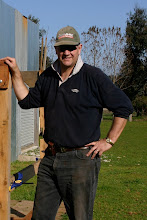This poem is very special - and I've italicised two bits that resonate particularly. Berry is an American poet. He comes from a part of the States that we've visited a few times - just often enough to have some connections with real people.
The first piece I've highlighted is about belonging to country - to borrow words that Australian aboriginal people use. Without minimising in any way that connection, I would note its universality. I don't think there is anyone who is not made better by a connection to a particular place.
The second piece may be read at my funeral - if anyone is reading my blogging and remembers.
An untitled sabbath poem
By Wendell Berry
It is hard to have hope
It is harder as you grow old
For hope does not depend on feeling good
And there is the dream of loneliness at absolute midnight
You also have withdrawn the leaf and the present reality of the future
But surely will surprise us
And hope is harder when it cannot come by prediction any more than wishing
But stop dithering
The young ask the old to hope
What do you tell them?
Tell them at least what you say to yourself
Because we have not made our lives to fit our places,
The forests are ruined
The fields eroded
The streams polluted
The mountains overturned
Hope then to belong to your place
By your own knowledge of what it is that no other place is
And by your caring for it as you care for no other place
This place that you belong to though you do not own it
For it is from the beginning and will be to the end
Belong to your place by knowledge of others
Who are your neighbors in it
The old man sick and poor
Who comes like a heron to fish in the creek
And the heron who man-like fishes
For the fish in the creek
And the birds who sing in the trees
In the silence of the fisherman and the heron
And the trees that keep the land they stand upon
As we too must keep it or die.
This knowledge cannot be taken from you by power or by wealth
It will stop your ears to the powerful when they ask for your faith
And to the wealthy when they ask for your land and your work
Answer with knowledge for the others who are here
And of how to be here with them
By this knowledge make the sense you need to make
By it stand in the dignity of good sense whatever may follow
Speak to your fellow humans as your place has taught you to speak
As it has spoken to you
Speak its dialect as your old compatriots spoke it
Before they had heard a radio
Speak publicly what cannot be taught or learned in public
Listen privately and silently to the voices that rise up
From the pages of books and your own heart
Be still and listen to the voices that belong
To the stream banks and the trees and the open fields.
There are songs and sayings that belong to this place
By which it speaks for itself and no other
Found your hope then on the ground under your feet
Your hope of heaven, let it rest on the ground underfoot
Be lighted by the light that falls freely upon it
After the darkness of the nights
And the darkness of our ignorance and madness
Let it be lighted also by the light that is within you
Which is the light of the imagination
By it you see the likeness of people in other places
To yourself in your place
It lights invariably the need for care toward other people
Other creatures in other places
As you would ask them to care for your place and you
No place, at last, is better than the world
The world is no better than its places
Its places, at last, are no better than their people
When the people have made dark the light within them
The world darkens.
Sunday, March 29, 2009
Subscribe to:
Post Comments (Atom)




I was so happy to find a copy of this online! But I have a question - I heard WB read this poem in a lecture/podcast, and at the end of it are the lines 'how does this outer light become inner light? / by being born of woman, becoming human.'
ReplyDeleteIs this poem in print without those last few lines? As I said, I've only heard it read.
I don't actually remember where I found it. But it was online. I didn't edit it down from that source though.
ReplyDeleteLast weekend I came across his book The Unsettling of America. It was written in the 1970s I think, but its wisdom is timeless.
This is a significantly inaccurate version of the poem Mr. Berry actually wrote. Please see pages 91-93 of his book "Leavings."
ReplyDeleteTom
ReplyDeleteI found it on the web - I'm alarmed that you say it's inaccurate - I'll do my best to correct it - or just take it down.